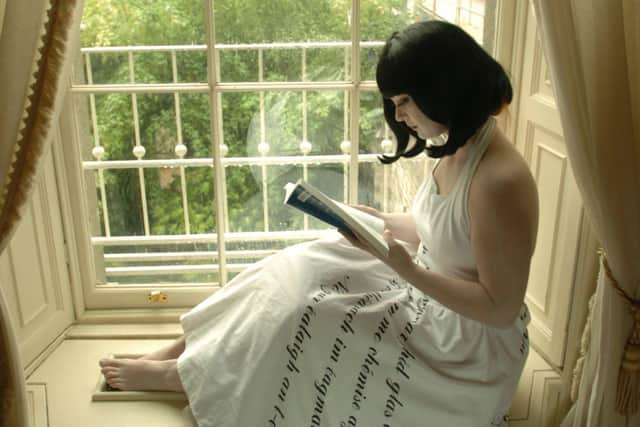Covid lockdown has helped us realise the beauty and power of poetry once again – Donna Ashworth


You see, lockdown took away so many of our beloved crutches, and when all of that was gone, we were simply left with words. We could type a message, join a group chat, or jump on a Zoom to meet with friends. And we talked, oh how we talked. And we read, because we still had that in our arsenal too.
And suddenly, our shattered and fearful hearts were scouring social media and the internet for ways to express our battered feelings as our world turned on its axis. Such as these excerpts from my books…
Advertisement
Hide AdAdvertisement
Hide Ad“There will be some very painful moments in your life. Moments, when the sun doesn’t seem to rise in your sky and the breath feels sucked clean out of your lungs. When food has no taste, the world has no joy and everything seems like an effort too far. Then one day, as is the way of this life, the sun will suddenly beat down on your face again, and the air will feel fresher than it ever did. And there will be laughter. And love. And joy. So much joy. And life will be sweet, like summer after a long winter. A winter so dark, each colour that appears, feels like the first time you are seeing it.”
Even the most hardened of poetic hearts were in dire need of some hope and, as someone who provided such prose on a daily basis, I saw that sudden rise in absorption. Words really mattered. It is a universal truth that the right words, in the right order, at the right time, can do so much. And that, my friends, is why poetry takes its place back at the top of our cultural creations, where it reigned proudly for centuries before quietly falling off its pedestal, somewhere along the way.
Poetry is back. Unearthed by a universal crisis unlike any other we have known.
Yet, it has moved on from the over-complicated text we studied at school. It is now bold in its simplicity and stands tall in its nakedness. Just words. Words that work their clever little way under your skin and nestle. Ready to penetrate the heart wherever remembered.
A poetry book is a tool box, a kit to cope with life’s twists and turns. Goodness only knows we must be better equipped than we have been. So many years spent studying the art of poetry and literature, but no time allocated to the worthwhile art of how to actually apply this mastering of emotion, to ourselves and our lives.
You see, there’s no subject off-limits when you are penning poetic prose. A few sentences can kick-start a revolution, a personal realignment or perhaps a vital healing journey. And it does. Every day. I see it happen.
Opening your eyes on a dark day to read the right verse can be drastic in its positive effect…
“Maybe you could start this week with a brave heart, leave the failures of the past on your pillow when you wake. Maybe you could start this week with a clean slate, fresh eyes and hope in your soul. Maybe you could start this week by congratulating yourself on getting through, so many weeks, so many tough days, so many slates wiped, so many brave new beginnings. Maybe you could start this week, with kindness, for yourself, first. Just to see, if the thing you have been waiting for, was always yours to give, actually. And not out there, in someone else’s hands, after all.”
Advertisement
Hide AdAdvertisement
Hide AdLikewise, someone swamped with the cloying mudslide that is grief, can be metaphorically pulled out of the mire…
“When I go don’t learn to live without me, just learn to live with my love in a different way. And if you need to see me, close your eyes, or look in your shadow when the sun shines. I’m there. Sit with me in the quiet and you will know that I did not leave. There is no leaving when one soul is blended with another. When I go, don’t learn to live without me, just learn to look for me in the moments. I will be there.”
There is no ceiling to the comfort poetry can bring to a heart in pain. Even those who see no way through that fog can be reached with the right words. And I know this to be very true…
“I saw it all, the day after I left. I saw my family, my friends, bereft. I saw their pain, confusion, their shock. I realised my demons had run amok. Of course I mattered, of course I was loved, of course I was not better off above. Because being above, means seeing it all. And now I can see that my life wasn’t small. My life was precious, I gave it away, I listened to darkness, it showed me the way. But now, from here, I see it anew. If only I’d stayed and pushed on through. But here I am, looking down from afar, watching the pain, a lifelong scar. I’ll never be gone from the hearts that I touched, If only I’d seen, I was always enough.”
So, I think you love poetry more than you know, I hope I am right. Because life is not easy, my friends, and the human brain is not swiftly mastered. Unlike technology, as it zooms ahead, our understanding of the brain and its whys, limps along. Mental health problems continue to rise and death by suicide with it. Our central computer is fickle, it needs what it needs. And it needs beauty, in all things. And words can bring that, in Technicolor. And they truly do.
Stirling-based poet Donna Ashworth is author of I Wish I Knew
Comments
Want to join the conversation? Please or to comment on this article.
